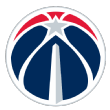Did the Dallas Mavericks get enough for Kristaps Porzingis?
In perhaps the most surprising move ahead of Thursday's NBA trade deadline, the Mavericks moved on from Porzingis barely three years after acquiring him from the New York Knicks in a blockbuster deal in January 2019. Since then, Porzingis has experienced health setbacks and struggled to find his place alongside star Luka Doncic, though he was playing as well as he ever has when on the court this season.
After giving up a pair of first-round picks to get Porzingis, the Mavericks ended up sending out the only draft pick (a second-rounder) in Thursday's trade to the Washington Wizards. In return, Dallas gets a pair of players who had disappointed in D.C.: guard Spencer Dinwiddie and shooting specialist Davis Bertans.
For the Wizards, Porzingis represents the same thing the Mavericks hoped he'd be: an effective co-star for their All-Star guard, Bradley Beal -- and incentive for Beal to re-sign as a potential unrestricted free agent this summer.
Let's go through what this trade means for both teams.
The deal
Washington Wizards get: Kristaps Porzingis, future second-round pick
Dallas Mavericks get: Spencer Dinwiddie, Davis Bertans
Mavericks: D
 This is the kind of deal that makes you wonder what you're missing. By taking Bertans and Dinwiddie off the Wizards' roster, the Mavericks seem to be doing them a favor. Yet it's Dallas who's sending out the second-round pick?
This is the kind of deal that makes you wonder what you're missing. By taking Bertans and Dinwiddie off the Wizards' roster, the Mavericks seem to be doing them a favor. Yet it's Dallas who's sending out the second-round pick?
In particular, Bertans has one of the league's least favorable contracts from a team standpoint. In the wake of hitting a career-high 200 3-pointers in just 54 games during the 2019-20 season, Bertans re-signed with Washington for $80 million over five years and hasn't reached the same level since. He has made just 32% of his 3-point attempts this season, falling out of the Wizards' rotation for long stretches.
There's some value in acquiring Bertans, who's a better shooter than he has shown in 2021-22. Despite the slump, Bertans is still a 40% 3-point shooter for his career, and he has experienced no decline from the foul line (28-of-30, 93%). Still, Bertans has to shoot at that level to get on the court, because the rest of his game is deficient. The Mavericks might be able to hide him at times in zone defenses, but Bertans' poor defensive rebound rates for a big man hurt him in that role.
Realistically, Washington should have expected to give up at least a first-round pick to move the remaining $49 million on Bertans' contract beyond this season. (That amount does go down by $11 million if Bertans plays fewer than 75% of his team's games in 2023-24 and is waived before the 2024-25 season.)
As for Dinwiddie, his fit with Bradley Beal was more of a disappointment for the Wizards than his play per se. Dinwiddie remains a useful volume scorer in units otherwise devoid of scoring punch, like Washington without Beal. But his efficiency defied the usual tradeoff with efficiency when paired with Beal. Dinwiddie's true shooting percentage went down despite his usage rate going from 24% without Beal to 15% with him, per NBA Advanced Stats.
That's a concern for a team thinking of pairing Dinwiddie with an even higher-usage ball handler in Doncic. We saw more promise from Dinwiddie as a spot-up shooter with the Brooklyn Nets, where he hit 37% of his catch-and-shoot 3-point attempts in 2019-20, according to Second Spectrum tracking on NBA Advanced Stats. That has dipped to a below-average 34% this season.
On the plus side, Dinwiddie's size (6-foot-5) allows him to defend multiple positions. If he shoots well enough, Dallas could even throw out lineups with all three of Doncic, Dinwiddie and Jalen Brunson to maximize playmaking on the perimeter.
Undoubtedly, adding Dinwiddie will be tied to Brunson becoming an unrestricted free agent this summer. If the bidding for Brunson gets too high, the Mavericks can feel more comfortable letting Brunson go with another ball handler on the roster. Still, that would be a disappointing outcome for Dallas, given Brunson is more than three years younger and has been a far more efficient scorer.
This move does little to help the Mavericks' books long-term. They'll pay Bertans and Dinwiddie slightly more base salary than Porzingis in 2022-23, and the only possible cap relief after that comes if they waive Dinwiddie in the summer of 2023, when just $10 million of his $18.9 million salary is guaranteed through June 30, according to ESPN's Bobby Marks.
Unless there's something important Dallas knows that we don't, this move seems like a step backward for the Mavericks both the rest of this season and beyond.
Wizards: A-
 I don't know how well this trade will work for the Wizards, but it's worth trying. As I noted after Beal's decision to undergo season-ending wrist surgery, there wasn't an obvious path to contention for Washington if he re-signs this summer. Making Porzingis Beal's co-star feels a little dubious, given Dallas found that same setup lacking with a better star guard, but at least it creates some variance that could work in the Wizards' favor.
I don't know how well this trade will work for the Wizards, but it's worth trying. As I noted after Beal's decision to undergo season-ending wrist surgery, there wasn't an obvious path to contention for Washington if he re-signs this summer. Making Porzingis Beal's co-star feels a little dubious, given Dallas found that same setup lacking with a better star guard, but at least it creates some variance that could work in the Wizards' favor.
Assuming Beal does stay in D.C., Washington will have some interesting lineup options next season. The Wizards are in position to re-sign Beal and center Thomas Bryant and still use at least a portion of their midlevel exception while staying below the tax line. Washington could target a pass-first point guard who's an upgrade on incumbent Raul Neto.
I'm also intrigued by the possibility of the Wizards just making Beal their point guard, which would allow them to put giant lineups on the court. If Porzingis plays power forward, they could use him, center Daniel Gafford and Kyle Kuzma in the frontcourt with Beal and Kentavious Caldwell-Pope at guard. Young forward Deni Avdija also fits into that vision of lineups with three players 6-foot-9 or taller.
Alternatively, Washington might be better off putting Porzingis at center with more speed and quickness around him. That's the team the Mavericks largely settled on this season, when Porzingis excelled defensively after a down 2020-21 season at that end of the court. The 54% opponents shot within five feet when Porzingis was the primary defender ranked 14th among players who have defended at least 150 such shots, per Second Spectrum tracking on NBA Advanced Stats.
It will help the Wizards if Porzingis rediscovers his 3-point touch. He has shot just 28% this season, down from 38% in 2020-21 and 35% for his career. Like Bertans, there's no evidence of widespread shooting decline. Porzingis is hitting 41% of his 2-point attempts from beyond 16 feet, per Basketball-Reference.com, and his free throw percentage (86.5%) is a career high.
The big concern with Porzingis is health. Because of injuries and a stint in the NBA's health and safety protocols, he has played just 34 of Dallas' 55 games and, in part because of shortened schedules, hasn't played more than 57 in a season since suffering an ACL tear in 2018.
If Porzingis can't stay on the court, Washington might regret this trade, though only so much. In the worst-case scenario, the Wizards still walk away without any salary on their books beyond Porzingis' 2023-24 player option. The Mavericks will still owe Bertans a minimum of $5 million guaranteed at that point.
